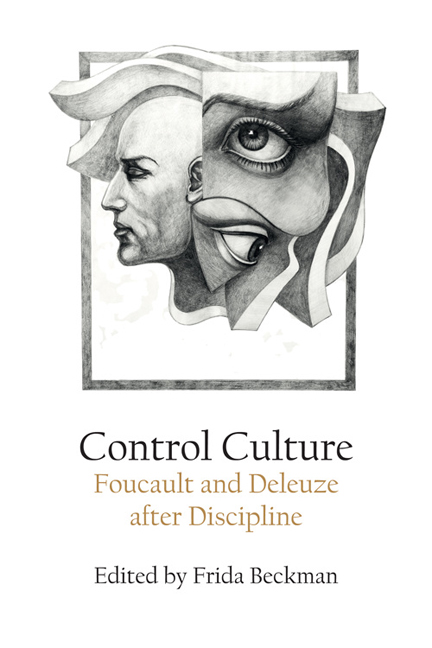Book contents
- Frontmatter
- Contents
- Acknowledgements
- Notes on Contributors
- Introduction. Control of What?
- 1 Notes from an Investigation of ‘Control Society’
- 2 Post-Mortem on Race and Control
- 3 Periodising (with) Control
- 4 Subjects of Sovereign Control and the Art of Critique in the Early Modern Period
- 5 Posthumanism, Social Complexity and the Political: A Genealogy for Foucault’s The Birth of Biopolitics
- 6 ‘That Path is for Your Steps Alone’: Popular Music, Neoliberalism and Biopolitics
- 7 Cinema in the Age of Control
- 8 Towards a ‘Minor’ Fascism: Panoptic Control and Resistant Multiplicity in TV’s Spooks
- 9 Species States: Animal Control in Phil Klay’s ‘Redeployment’
- 10 Control and a Minor Literature
- 11 Philosophy and Control
- Index
2 - Post-Mortem on Race and Control
Published online by Cambridge University Press: 05 May 2021
- Frontmatter
- Contents
- Acknowledgements
- Notes on Contributors
- Introduction. Control of What?
- 1 Notes from an Investigation of ‘Control Society’
- 2 Post-Mortem on Race and Control
- 3 Periodising (with) Control
- 4 Subjects of Sovereign Control and the Art of Critique in the Early Modern Period
- 5 Posthumanism, Social Complexity and the Political: A Genealogy for Foucault’s The Birth of Biopolitics
- 6 ‘That Path is for Your Steps Alone’: Popular Music, Neoliberalism and Biopolitics
- 7 Cinema in the Age of Control
- 8 Towards a ‘Minor’ Fascism: Panoptic Control and Resistant Multiplicity in TV’s Spooks
- 9 Species States: Animal Control in Phil Klay’s ‘Redeployment’
- 10 Control and a Minor Literature
- 11 Philosophy and Control
- Index
Summary
Control names a dynamic mode of power which seeks to proliferate difference in order to modulate and contain its disruptive force. Thus, one starting point for a critique of control is to think with and through its dependency on difference, including difference marked as racial. From this premise, it is possible to pursue how racial assemblages constitute the ideological grounds for accounts of control, and explore why control might become an increasingly salient metaphor for racial power as the political centrality of race intensifies with the global rise of ethnonationalism and outright fascism. Although thinking of race as a matter of technical control of bodies involves working through posthumanist and new-materialist methods for social analysis, it also involves retrospectively interpreting the role of racial difference in the constitution of control theory's paranoid figuration of technology and the state. In the works of William Burroughs and Gilles Deleuze, control exhibits a desire for the destruction of subjectivity through constant modulations of difference and the integration of individuals into networked aspirations of capitalist accumulation. This rhetoric on the technological penetration of the body by the state, I will argue, reflects a generalisation of existing forms of race war into the Cold War state form, allowing for control theory to appear deracinated and globalised. Nonetheless, the critique of control demonstrates the importance of the concept for grappling with deterritorialised models of empire, in which race is affectively modulated across media environments, biotechnologies and war apparatuses. From this vantage point, the engagement of race and control charts a different path for critical race theory than do the largely polemical critiques by some Deleuzeans of the structuralism and representationalism of racial formation theory. The intersection of race and control poses questions of whether and how contemporary forms of empire are able to take hold of race's plastic potential for differentiation.
The horror of control emerges not in the active attempt of a commanding operator to overcome resistance, but in the dream of a total realisation of the operator's control. At that point control itself vanishes. In William Burroughs’ 1978 essay ‘The Limits of Control’, the capability of the state to exercise control over a population is presented as inherently limited by the agency of subjects who potentially resist the control order.
- Type
- Chapter
- Information
- Control CultureFoucault and Deleuze after Discipline, pp. 34 - 43Publisher: Edinburgh University PressPrint publication year: 2018

